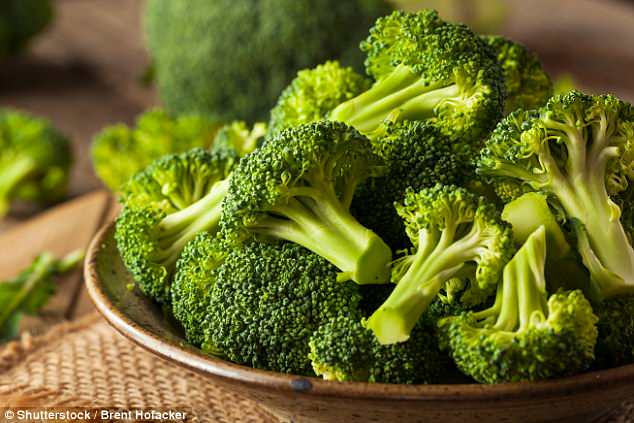A GP has described broccoli as a ‘life saver’.
According to TV Dr Rangan Chatterjee, who has appeared on the BBC programme Doctor in the House, if people are going to eat any vegetable, broccoli should be the one they opt for.
Dr Chatterjee, who recently wrote the book ‘The 4 Pillar Plan’, claims the humble vegetable boosts people’s gut bacteria, which helps to support their immune systems and improve their bowel health.
Previous research suggests ‘good’ bacteria in the gut is also linked to people being a healthy weight and having a reduced risk of suffering mental-health disorders.
In a piece for MailOnline, Dr Chatterjee, who recently spoke at the Guts Conversation meeting, explains why broccoli is so healthy and the importance of gut health.
‘Broccoli is a life saver’
Broccoli is a life saver. It does a number of things.
As it goes through the small intestine it helps to balance your immune system.
And then the fibre from the broccoli that can’t be digested goes along to the colon, which is the last part of the bowel, where most of the gut bugs reside and they start feasting on the fibre and making short chain fatty acids.
Short chain fatty acids are important for colon health.
I find vegetables quite remarkable and when you examine what they are doing throughout the immune system it is quite incredible really.
How important are gut bacteria?
There are trillions of bugs that live inside us. Also viruses and fungi.
There is more science emerging now that the health and interaction of those gut bugs has a profound influence not only on our digestive function but also on our mood and brain function.
Gut bacteria may be implicated in our weight and joint pain. We are realising more and more that our gut is very important. A lot of modern living is trashing our guts.
That is one of the reasons we think we are having an epidemic of chronic disease like allergies and intolerances.
There is a lot of science emerging on it. We don’t know everything as it is a young science. But as a GP I think we know enough to start making changes to our patients.
The side effect of ‘gut health’ being such a buzz phrase at the moment is that, I am finding in my practice, more people are open to discuss these things and are coming in having read something about gut health, saying ‘I want to talk to you about my gut health. I don’t think it is quite right.’
The bugs in your gut weigh roughly the same amount as your brain, which I find remarkable. That is a lot.
When we talk about food we are often talking about fat and carbs, and which one is the villain. If one does have to be the villain.
The food that you eat has a huge impact on those gut bugs and those bugs talk to your immune system.
Seventy per cent or so of your immune-system activity occurs in your gut. There is a three way interaction, your food choices, your gut bugs and your immune system.
How many people have heard of inflammation, which is behind a lot of these chronic diseases? A big source of that inflammation comes from your gut.
Inflammation comes from your immune system. I am mentioning this to show how important your gut health is. Those gut bugs talk to your immune system and send it messages.
Those messages determine whether your body is going to express itself, whether it is going to have inflammatory messages around the body or whether it is going to have an anti-inflammatory messaging profile.
That is why gut health can impact multiple things in the body as it is a key intersection point.
Is inflammation good?
Just to make sure we are on the same page, inflammation is a good thing.
If you sprain your ankle, you will get inflammation. It will get red, hot, swollen and that will encourage inflammatory mediators to come and help repair the area.
A few days later you want that all to calm down. What we are talking about with these processes is when it becomes chronic.
The inflammation that drives things like Type 2 diabetes and these modern lifestyle diseases is called chronic unresolved inflammation. It is that same process but it has gone permanent. That is the best way to think about it.
There is a communication in our body between our gut and our brain. There are multiple communication pathways. I don’t even think we know them all yet. We are discovering more and more.
‘Getting stressed makes a condition worse’
I see a lot of patients with IBS. About 20 per cent of the population are going to have it at some point.
Stress management is always part of my treatment for it. It always plays a role. Getting stressed makes a condition worse.
Professor Simon Gaisford, from University College London, added: ‘We are currently working with the English Institute for Sport, which is based at the University of Bath.
‘It is preparing a lot of athletes for the 2020 Olympic Games and so they are very interested in whether elite sports people should or should not be taking probiotic supplements.
‘The reason is because when you are the top for your game stress is a massive issue.
‘So for athletes going on long-haul travel you have got the stress of the flight itself, you have got the change in diet when you get to the competition venue and the stress, depends what sport you are playing, but you might only have one shot to get something right.
‘There is a lot of interest whether elite sports people should be on probiotics to try and calm down [the] stress response.’













